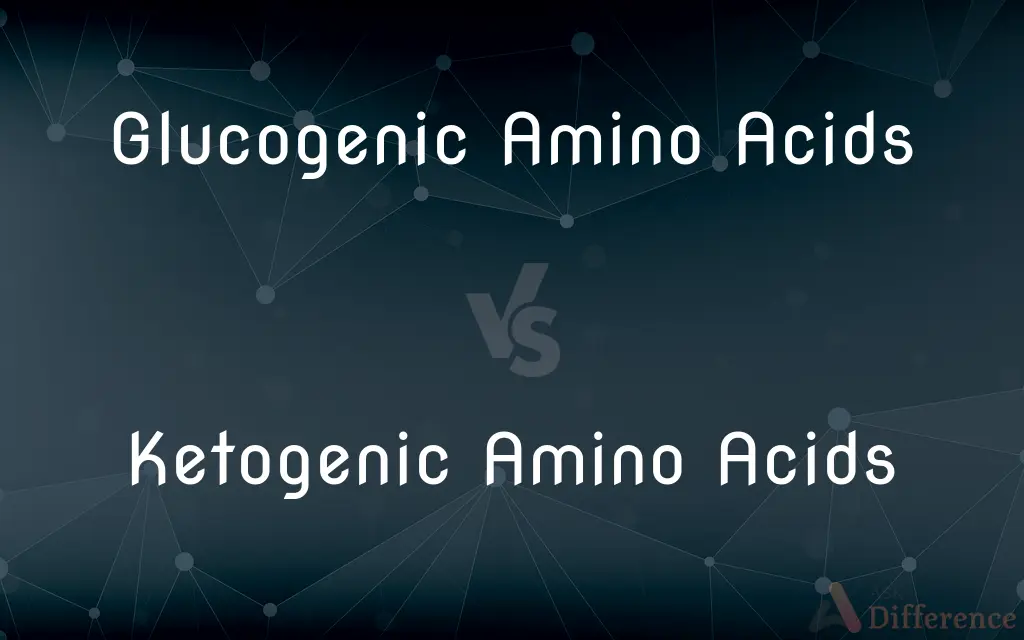Glucogenic Amino Acids vs. Ketogenic Amino Acids — What's the Difference?
Edited by Tayyaba Rehman — By Fiza Rafique — Published on December 30, 2023
Glucogenic amino acids can be converted to glucose, while ketogenic amino acids can be converted to ketone bodies.

Difference Between Glucogenic Amino Acids and Ketogenic Amino Acids
Table of Contents
ADVERTISEMENT
Key Differences
Glucogenic amino acids, as their name implies, are amino acids that can be converted into glucose through gluconeogenesis. These amino acids primarily undergo transformation in the liver to generate intermediates for the glucose production pathway.
On the other hand, ketogenic amino acids can be transformed into ketone bodies. Ketone bodies, such as acetoacetate and beta-hydroxybutyrate, are generated when glucose availability is low, serving as an alternative energy source for tissues like the brain.
Some amino acids are exclusively glucogenic, meaning their degradation leads only to glucose or precursors of glucose synthesis. These amino acids can play a critical role in maintaining blood sugar levels during extended periods of fasting or intense exercise.
Contrarily, some amino acids are purely ketogenic. Their metabolic breakdown results solely in the production of ketone bodies. Ketogenic amino acids become particularly crucial in conditions like prolonged fasting or a ketogenic diet, where the body relies heavily on ketones for energy.
It's worth noting that there are also amino acids termed as "both" or "amphibolic." These particular amino acids have the capability to be either glucogenic or ketogenic based on the body's needs and the specific metabolic pathways they enter.
ADVERTISEMENT
Comparison Chart
Metabolic Conversion
Converted to glucose.
Converted to ketone bodies.
Energy Source during
Useful during fasting or intense exercise.
Predominant in prolonged fasting or ketogenic diet
Exclusive Amino Acids
Examples: Alanine, Glycine.
Examples: Leucine, Lysine.
Role in the Liver
Undergo transformation for glucose production.
Undergo transformation for ketone body production
Importance in Metabolic Conditions
Maintains blood sugar levels.
Provides alternative energy during low glucose.
Compare with Definitions
Glucogenic Amino Acids
Undergo metabolic pathways leading to glucose.
In the liver, glucogenic amino acids are vital for gluconeogenesis.
Ketogenic Amino Acids
Do not contribute to glucose synthesis.
Unlike glucogenic ones, ketogenic amino acids won't raise blood sugar levels.
Glucogenic Amino Acids
Primarily produce glucose or its precursors.
Alanine, a glucogenic amino acid, produces pyruvate which can be turned into glucose.
Ketogenic Amino Acids
Metabolized to produce ketone bodies.
Ketogenic amino acids are abundant in the ketogenic diet.
Glucogenic Amino Acids
Can be converted into glucose.
Glucogenic amino acids help in maintaining blood glucose levels.
Ketogenic Amino Acids
Essential in certain metabolic states.
In ketosis, ketogenic amino acids support the body's energy needs.
Glucogenic Amino Acids
Essential during prolonged fasting or exercise.
During fasting, glucogenic amino acids prevent hypoglycemia.
Ketogenic Amino Acids
Include leucine and lysine exclusively.
Leucine is a strictly ketogenic amino acid and doesn't feed into glucose pathways.
Glucogenic Amino Acids
Counteract low blood sugar conditions.
Diabetics rely on glucogenic amino acids to avoid dangerously low glucose.
Ketogenic Amino Acids
Provide energy when glucose is scarce.
The brain can utilize ketone bodies from ketogenic amino acids when glucose is low.
Common Curiosities
In what condition might the body use ketogenic amino acids for energy?
During prolonged fasting or when on a strict ketogenic diet.
Are there amino acids that can be both glucogenic and ketogenic?
Yes, some amino acids, like isoleucine and phenylalanine, can be both glucogenic and ketogenic.
Why are ketone bodies important?
They provide an alternative energy source when glucose availability is low.
Which amino acids are strictly glucogenic?
Examples include alanine and glycine.
Which are strictly ketogenic amino acids?
Leucine and lysine are strictly ketogenic.
Which organ plays a primary role in metabolizing these amino acids?
The liver plays a crucial role in the metabolism of both glucogenic and ketogenic amino acids.
How do ketogenic amino acids support a ketogenic diet?
They can be broken down into ketone bodies, supporting the state of ketosis.
Why are glucogenic amino acids vital during fasting?
They help maintain blood glucose levels by feeding into glucose synthesis pathways.
What are glucogenic amino acids?
Glucogenic amino acids can be converted into glucose in the body.
And what about ketogenic amino acids?
Ketogenic amino acids can be metabolized into ketone bodies.
What metabolic pathway do glucogenic amino acids feed into?
Glucogenic amino acids feed into gluconeogenesis to produce glucose.
Can ketogenic amino acids raise blood sugar levels?
No, ketogenic amino acids are metabolized into ketone bodies, not glucose.
Is the brain dependent only on glucose for energy?
No, the brain can also use ketone bodies, especially from ketogenic amino acids, during low glucose availability.
Can a diet be rich in both types of amino acids?
Yes, many diets, especially protein-rich ones, can contain both glucogenic and ketogenic amino acids.
Why are these amino acid classifications important?
They help understand metabolic pathways and the body's response to different dietary and fasting conditions.
Share Your Discovery

Previous Comparison
Radial Nodes vs. Angular Nodes
Next Comparison
Positive Economics vs. Normative EconomicsAuthor Spotlight
Written by
Fiza RafiqueFiza Rafique is a skilled content writer at AskDifference.com, where she meticulously refines and enhances written pieces. Drawing from her vast editorial expertise, Fiza ensures clarity, accuracy, and precision in every article. Passionate about language, she continually seeks to elevate the quality of content for readers worldwide.
Edited by
Tayyaba RehmanTayyaba Rehman is a distinguished writer, currently serving as a primary contributor to askdifference.com. As a researcher in semantics and etymology, Tayyaba's passion for the complexity of languages and their distinctions has found a perfect home on the platform. Tayyaba delves into the intricacies of language, distinguishing between commonly confused words and phrases, thereby providing clarity for readers worldwide.













































